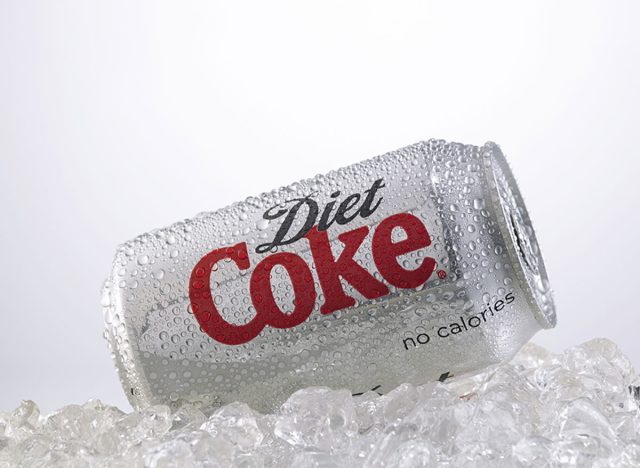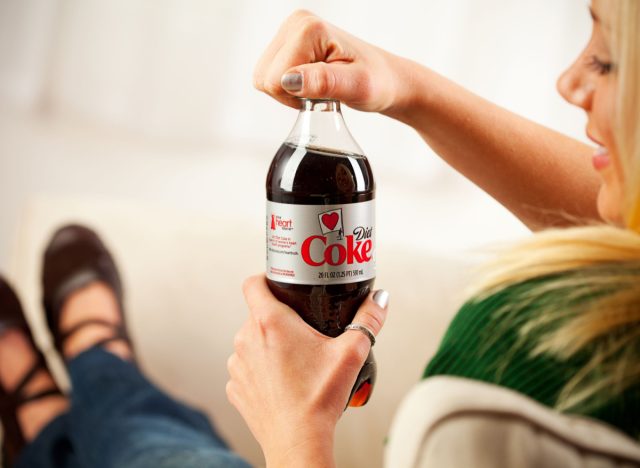When choosing which soda to drink, you would think a "sugar-free" or "calorie-free" option like Diet Coke would be healthier. It makes sense, considering the havoc sugar can wreak on your overall health.
Research published in Nutrients earlier this year concluded that people who consume high amounts of added sugar, especially from sugar-sweetened beverages, are at a greater risk of several health conditions, including obesity, diabetes, hypertension, and cardiovascular disease. Not to mention the damage sugary drinks can do to your oral health.
While it's unlikely anyone drinks soda for its health benefits, they may think they're doing less harm to their health by opting for low-calorie sodas like Diet Coke instead of their sugar-sweetened counterparts. But, as is often the case, commercial food and beverage products marketed as "healthier options" come with their own baggage and health consequences.
For example, the artificial sweeteners found in Diet Coke are calorie-free, but that doesn't mean they're better for you. According to a 2017 study published in the American Heart Association's (AHA) journal Stroke, the artificial sweeteners in diet sodas can skyrocket your risk of heart disease, stroke, and dementia—three of the top 10 causes of death in America.
If you're wondering whether or not Diet Coke is bad for you, we got you covered. We chatted with Trista Best, MPH, RD, LD, a registered dietitian and consultant with Balance One, who weighs in on the health impacts of drinking Diet Coke.
Diet Coke can harm your health in several ways

Besides upping your risk of chronic disease, drinking Diet Coke can also damage your kidneys and negatively impact your gut microbiome. A 2017 study published in CJASN found an association between diet soda consumption and an elevated risk of kidney disease. In addition, the artificial sweeteners in diet soda were found to negatively affect gut health and increase the risk of obesity, diabetes, and metabolic syndrome, according to a 2019 study published in Advances in Nutrition.
"Diet Coke, like any other food or drink, is processed by the kidneys. Large amounts of diet soda have been connected to kidney damage and disease. This is due to the high phosphorus and synthetic ingredients passing through the kidneys," explains Best. "Also, diet soda changes the gut's microbiome and exacerbates the inflammatory response in the body. The artificial nature of the ingredients in Diet Coke makes it moderately inflammatory. The changes to the gut made by artificial sweeteners also exacerbate inflammation in the body."
Artificial sweeteners encourage overeating
Diet Coke may be free of sugar and calories, but that's about as far as its health benefits go. To deliver its sweet taste without sugar, each can of Diet Coke contains roughly 200 milligrams of the artificial sweetener aspartame, which is approximately 200 times sweeter than table sugar. In a 2013 study published in Trends in Endocrinology & Metabolism, researchers concluded that artificial sweeteners like aspartame have the counterintuitive effect of promoting weight gain and increasing the risk of chronic disease due to their impact on metabolism and hunger.
"Artificial sweeteners are connected with overeating later in the day. The glucose-insulin response they cause can create higher cravings for later meals and potentially overeating," says Best. "This, along with changes in the gut, have connected Diet Coke to higher rates of type 2 diabetes and other chronic diseases."
Is there a safe amount of Diet Coke to drink?

"While it's best to avoid sodas—diet or not—drinking a moderate amount of diet soda can be safe for most individuals. The Food and Drug Administration has set an acceptable daily intake for aspartame at 50 milligrams per kilogram of body weight per day," Best tells Eat This, Not That!
However, based on that criteria, a 132-pound person would be safe to consume around 12 cans of diet soda daily—an excessive amount for even the biggest cola fans. If you still can't resist sipping soda, Best recommends not going overboard and keeping your intake around two cans or less per day.
Is Diet Coke better for you than regular Coke?
Let's not sugarcoat the facts: Neither regular nor diet sodas are healthy. While Diet Coke is associated with a laundry list of adverse health outcomes, good old Coca-Cola has its own health detriments. Since regular Coke is sweetened with sugar, it's high in empty calories that spike your blood sugar, contribute to weight gain, and increase blood pressure. So ultimately, when it comes to choosing between regular and Diet Coke, it's a matter of "pick your poison."
"The answer to whether Diet Coke is bad for you isn't black and white," says Best. "Considering the artificial ingredients used in diet and regular sodas, it can be assumed that any diet is better without diet soda. However, if you're choosing between regular or diet soda, the diet option will be better since regular soda is higher in calories and the negative health effects are associated with more chronic conditions and higher mortality rates."
No comments:
Post a Comment